#ignore the fact that this was a dream sequence
Text
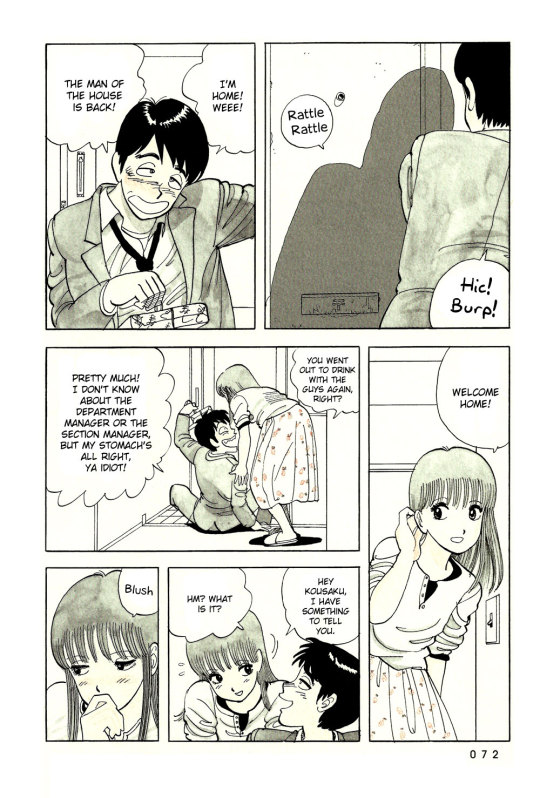
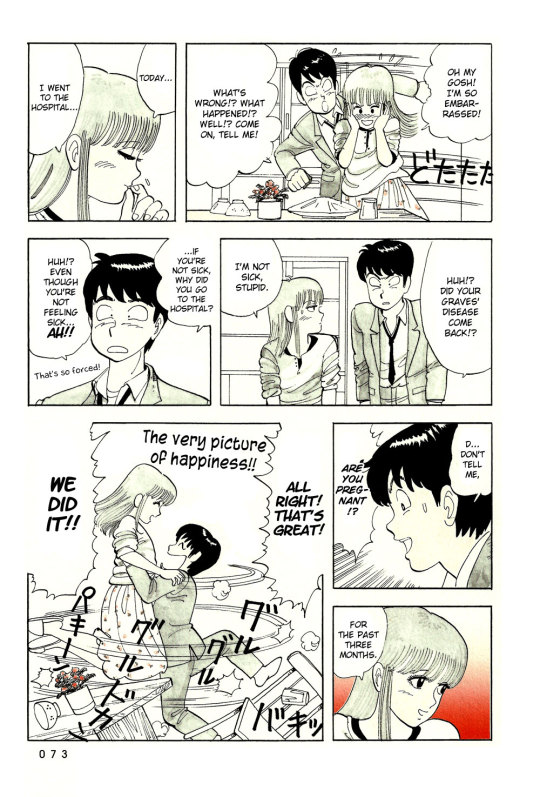
I knew it could be done.
#Stop!! Hibari-Kun!#Manga#ignore the fact that this was a dream sequence#if he believes hard enough he can impregnate her he just has to try over and over again#if you're unfamiliar with the manga hibari is about as explicitly trans as you can get for the 1980's
138 notes
·
View notes
Text
i am once again imploring you all to watch the 1999 animated sitcom downtown which aired on MTV for exactly one season before getting canceled. it's on youtube. do it for me
#the animation is so cool and the soundtrack is good and they all have such great nyc accents just a dream to listen to#just ignore the fact that the show starts with a fantasy sequence where the twin towers get blown up from the sky and lower#manhattan is destroyed with people running through the streets in panic#text
7 notes
·
View notes
Note
hey sorry to ask you but what is the destiel lamppost thing? if u know what it is
Hi anon!!! I wasn't ignoring you I just wanted to be able to sit down and type out the lore.
So "why lamp"/the destiel lamp thing starts with 15x10, The Heroes' Journey, in which Dean and Sam are stripped of the luck/protections that being written as protagonists gives them by Chuck (very meta) and Dean ends up needing cavities filled.
Garth gives him laughing gas for the procedure, during which Dean has a dream of a black and white 50s style dance sequence. It takes place in the bunker and while initially it's Dean dancing with Garth, eventually Garth leaves and Dean runs over to pick up a lamp from the corner of the room to dance with. Here's the whole thing:
youtube
But once it's Dean and the lamp, the dance becomes markedly more romantic - he's dancing with the lamp as a partner, not like the tap dancing he and Garth do side-by-side.
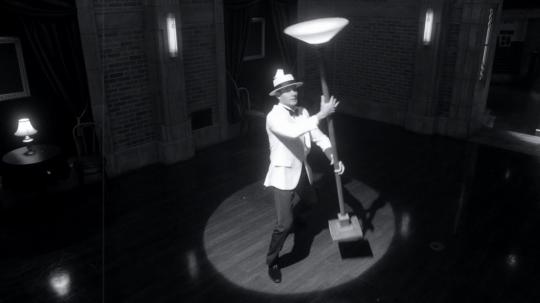
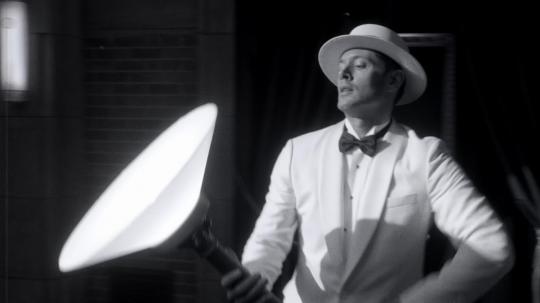
Also important to note that they're dancing to "Let's Misbehave," which is about sex and also was written by Cole Porter, who was gay. This is a really good breakdown of the dance itself, the significance of the song and Cole Porter and its connections to old queer Hollywood.
At the end of the episode, Dean sees Bess and Garth dancing in their living room through the window and says "You know, I always thought I could be a good dancer if I wanted to be."
This is pretty clearly associating the dream sequence, and Dean dancing with a lamp, as about Dean longing for a partner and therefore the lamp as a stand-in for that partner.
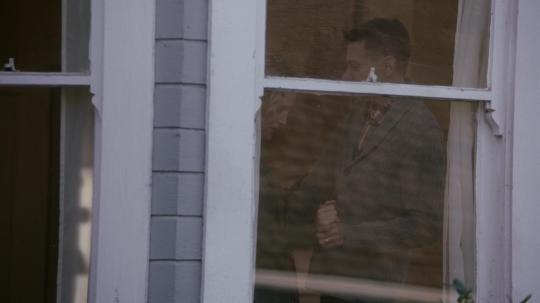

NOW. Meta was written as soon as this episode aired with people linking the lamp to Cas, and there has continued to be much better meta than I can write here - this one is in-depth and connects it to themes across the seasons and Dean's years-long character arc. "Cas is Lamp" even has its own superwiki page.
But besides all the normal meta deancas reasons and the fact that this comes at a time when Dean's character arc had been building both to him wanting to settle down with someone AND that someone being Cas (this is the episode right after The Trap and Dean's "I should have stopped you/of course I forgive you" prayer), Cas (and angels broadly) is associated with light and lamps throughout the series, perhaps most iconically in 4x16.

So, after 15x18, "the lamp thing" was something frequently cited and that we held onto as another thing they'd dropped alluding to (nay, ensuring - because they'd surely somehow have to wrap up Dean's own arc of wanting a partner to settle down with) a happy deancas endgame where Cas is rescued and they live happily ever after.
And then. 15x20 happened. And "why lamp" took off as part of a long list of "if they were just never going to mention Cas again, let alone resolve the confession or this very key part of Dean's story arc of wanting to settle down, why did they include [long list of things that make no sense with the ending we got]." Why lamp has become shorthand for a long list of missing links and loose ends and things that just don't add up. If deancas wasn't going to be the happy endgame, then why lamp. Why did they drop so many clues and work up to a very clear resolution for Dean's character arc if they were just going to drop it. Why lamp. It's one of those things that will haunt us because we will never get an answer. Okay grandma, let's get you to bed. But why lamp.
#ok im assuming this is what you meant by destiel lamppost thing lol#if it wasnt im sorry and behind on the times#but there is another anon in my inbox asking about why lamp so hopefully this helps them!#answered#anonymous#long post
233 notes
·
View notes
Text
Ok was just having this debate with a friend who thinks Mission Impossible 2 is an abomination. And while I will give her that it is an anomaly within the MI canon and arguably is not a MI movie (Ethan doesn’t go rogue, he’s behaving OOC, the tone and vibe are off) I stand by the fact that it is a quintessential, iconic, and absolutely incredible Y2K movie.
1. The Soundtrack: much like the year 2000 classics Charlie’s Angels and Dracula 2000 this movie features Limp Bizkit, Metallica, Rob Zombie, Butthole Surfers, and Foo Fighters to name a few. It’s such an abrupt departure from the first film (the majority of songs on the first MI soundtrack aren’t even featured in the movie.)
There’s just something so utterly Y2K about Ethan throwing his glasses over the side of a mountain and them exploding to the sound of Limp Bizkit.

2. Ethan: just Ethan Hunt in this movie. Listen there are 6 MI movies that show Ethan as a perpetually serious genius with a passionate dedication to his friends and his mission. But there is only one movie where Ethan hunt is a sexy playful badass and that’s MI2. I would go as far as to say that Tom Cruise has never looked better in his life and I know that’s blasphemy against our lord and savior Lestat. But Ethan in MI2 is just GIVING. The arms. The smile. The ridiculous blowout that both falls into his eyes and tousles in the wind. This is peak sex appeal Cruise (it’s also before we knew he was all culty and creepy so it feels less bad to be deep in my feels about how hot he is.)



3. The John Woo of it all: John Woo said the year is 2000 and we will have DRAMA we will have FASHUN and we will have BIRDS. There is so. Much. Unnecessary. Slo. Mo. In. This. Film. SO MUCH. And the action sequences? I know this is a franchise known for its over the top action sequences but the ones in this film don’t even make sense.
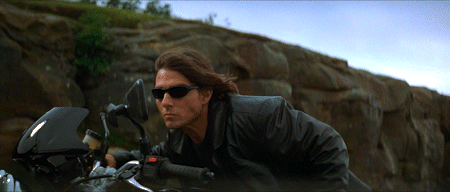

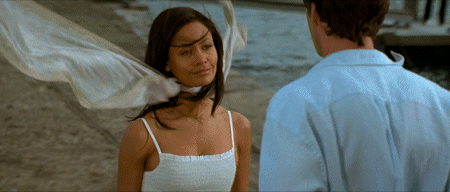

4. The Title Sequence: honestly if anything in this movie is a fever dream (even more than the doves that fly out of an explosion) it’s the title sequence which feels like a mashup of every Y2K music video and action movie combined.
5. The Birds: listen I wasn’t going to ignore this scene. THIS SCENE. What can be said? It’s iconic. It’s absurd. It’s the epitome of the decadence, drama, and corniness of the year 2000.
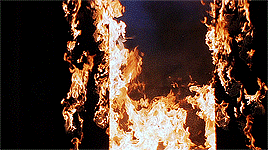
Anyway, thanks for coming to my Ted Talk. MI2 may not deserve a place of honor in the official canon of Mission Impossible but it is hands down one of the best movies of 2000 and it deserves to be remembered as such.
#mission impossible#mission impossible 2#ethan hunt#tom cruise#y2k movies#y2k aesthetic#y2k#movie review#movies#year 2000
57 notes
·
View notes
Text
Since I still see people complaining about the sex scenes in Playboyy:
The stark contrast between artistically crafted shots of non-sexual scenes (some of those truly look like they could be art installations) and sex scenes that seem unaesthetic, hasty, somewhat badly performed and sometimes even comical, highlights the conflict between what we expect and dream of versus the true nature of interpersonal relationships.
Dream versus reality is one of the big themes in this series. We can see it in the way the characters expect certain things from their relationships, only to be repeatedly confronted with the fact that they won't get what they want. Teena dreams of sleeping with a virgin, but both his feelings and Zouey's hesitation get in the way of it. Zouey wants to conform to society's expectations about sex, he really does try. But in the end sex repulses him for some reason. First dreams of running away from home to have a steamy affair with some hot guy, but he learns that Soong isn't really into the idea. Soong seems to like First, but he is hit with the reality that affection won't be able to buy you dinner and it won't pay your rent. And then we have Nont who tells himself that his brother is still alive, while deep down he already knows that something bad must've happend to Nant (I'm delulu about that too, so I feel you Nont!)
Likewise the viewer is also forced back into reality. The dreamlike sequences end abruptly and instead quick humping and bad audio (the Japanese!) is thrown at us. Did you expect something kinky and hot? Did you expect romantic kisses in the rain? Well, you won't get any of that! In Playboyy sex scenes are used as a tool to make the viewer look beyond the dream. Sometimes sex is used for educational purposes or it tells us more about a character and sometimes it makes us think about our own relationship with kink and sex.
In addition, I believe it is also a direct critique towards the majority of BL series that are out on the market right now. Because those shows usually try to ascend sex between two men onto a higher plane. They only highlight the dreamlike romantic aspects of gay relationships and ignore real life issues, even the really small things (how many sex scenes have we all seen where they don't even use the lube and simply go straight at it...). Sex is not soft background music, slow motion shots, perfect hair and pretty make up, the right pose at the right time... Instead it can be messy, funny, weird, with sweat pouring down your face and smeared mascara.
65 notes
·
View notes
Text
The Nightbringer, how lesson 9-A tells us everything, and why it’s (probably) not Barb
I’m working on lesson 3 summary, but now that a good portion of the fanbase seems to have gotten through lesson 10, I feel it’s timely to get my thoughts out there ahead of covering lesson 10 because the story will likely continue before I’m done.
And I think a lot of you are ignoring some of the contextual clues.
Don’t read this if you don’t want lesson 8+ spoiled yet.
Ahead of the game releasing, most of the fanbase thought the prologue was a peek into how Barbatos met Solomon because it matched up with the lore in the OG game and Solomon was narrating. There were also other hints that Barb was behind things via promotional media and art. Pair that with his well-known time travel abilities, and it all seems very straightforward and obvious.

We learn in lesson 8, though, that the boy in the prologue video isn’t Solomon -- it’s Adam, and it’s heavily implied that he’s Lilith’s lover.
This fact alone doesn’t actually change much beyond the implied relationship between the Nightbringer and Solomon. It is relevant that Solomon is narrating, though, because they do have a significant relationship.

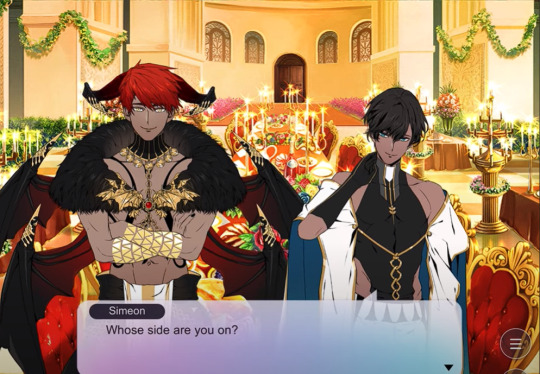
In lesson 9-A (and the node in lesson 10 that’s a continuation), which I have not gotten to myself yet, Solomon has a telling conversation with the Nightbringer after being confronted with illusions of Diavolo and Simeon meant to test his resolve. They’re squabbling over him, the obvious metaphor for humanity.


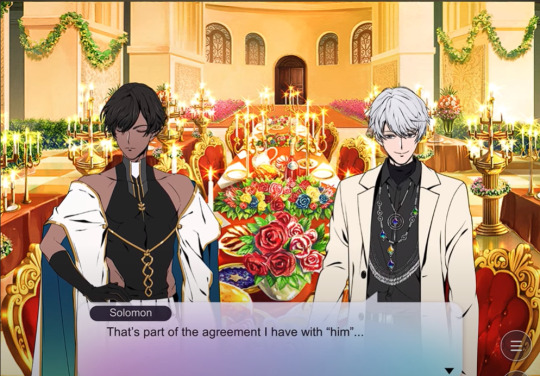
Solomon chooses neither, because he believes humanity doesn’t need either demons or angels guiding them. This is meant to mirror a choice he made in the past, as the self-appointed steward of humanity.
And furthermore, back then... the Nightbringer was likely one of the advocates of one of these sides. Furthermore, whatever this agreement he made with the Nightbringer is meant to ensure his “freedom”, even though...
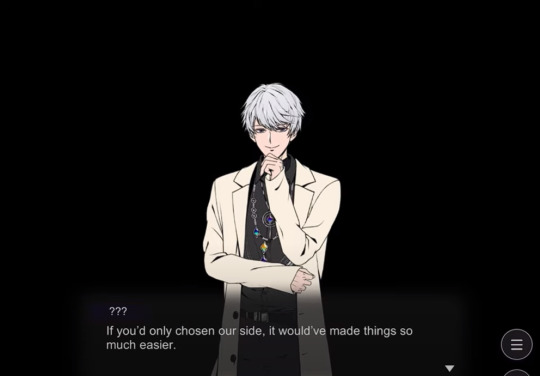
The Nightbringer clearly wanted him to choose one of the presented sides, not neither. So which side was he on? He reveals his hand here, too, if you read into it far enough.
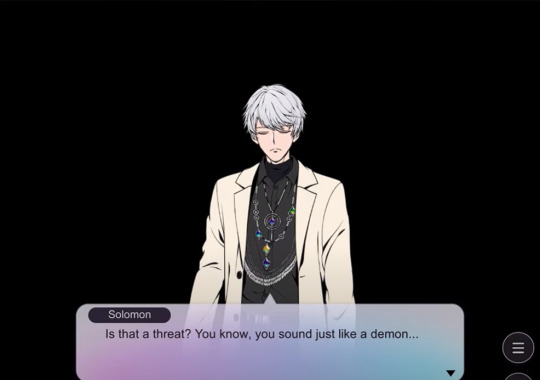
Why on earth would Solomon make this retort if the Nightbringer was actually a demon? If he was a demon, of course he’d be acting like one. It’d be no surprise, and certainly not considered an insult.



We got an angel who acts like a demon. This conversation doesn’t make any sense otherwise.
The Nightbringer is an angel? But that’s CRAZY!
Is it?
Is it really?
There’s one angel in particular who has a similar connection to Solomon as Barbatos, who has also had a significant role in his past: Michael.
We find out in the dream sequence flashback in S3 that Michael was eyeballing Solomon before the Great Celestial War. We know he’s the one who fished us out of that sequence, and warned us that the effect we had on the brothers past selves will carry on into the present (though admittedly this never manifests later). We find out he approached Solomon when he was lost and confused and we know he gave him his Ring of Wisdom, which grants the power to control demons. We find out in Nightbringer that Solomon waged war against the entire Devildom in an effort to leverage his newfound power to better humanity’s position. We learn that war was ultimately inconclusive. At numerous point in the story, Michael is referred to as a “demon in disguise” and a sadist like Lucifer.
We don’t know why Michael would give his very powerful ring to Solomon, but it likely was part of some agreement.
What doesn’t line up with this theory is a lack of motivation. I have no idea why Michael would want us to fling us back to this point of time, after the war. It sounds like he’d want to prevent the war entirely. Adam also meets the Nightbringer in the Devildom, and I can’t see the Devildom allowing Michael to just waltz in and meddle with things, particularly after the Great Celestial War. I’m not sure why they’d let any of them in, but I digress...
The other small details
There’s other small details strewn throughout the story that point to an angel, or at least someone that isn’t Barb.
Adam says he heard trumpets heralding the Nightbringer’s arrival. The king in the prologue also blows a trumpet.
You know what trumpets are associated with? Angels. According to this wikipedia article:
“In Christian Eschatology, all the first six trumpets are used to serve as a wake up call to the sinners on Earth and a call to repentance. Each trumpet blast brings with it a plague of a more disastrous nature than the one before it. The trumpet is used to build anticipation and tells the reader that an alert, announcement, or warning is about to take place. The seventh trumpet does not bring a plague with it. Rather, it is sounded so that glory is given to God and His kingdom is announced.”
There’s a bunch of other biblical associations, too. Barbatos has no trumpet symbolism in any point in the story. His callsign is portals.
Additionally, Barbatos interacts with time via doors.

The Nightbringer sees time as mud, which just might be the liquid swirling around in the Nightbringer trailer.
Who is the king?
The prologue implies that the Nightbringer is summoned via trumpets, and the trumpet is blown by a king. The Barbatos puppeteering art implies it’s a human king, but I’m not so sure.
Understanding who the king is may be instrumental in figuring out who the Nightbringer is. Is it a human king? Is it King Solomon? Is it the Demon King? Is it God? Is it someone completely different? It implies the Nightbringer acts at the behest of someone else, but so far it doesn’t sound like he is right now. And if he’s acting against Solomon, it would be quite problematic if he was tethered to him via a pact like Barbatos clearly is.
My conclusion
It’s either Michael and his motivations are simply more complex than I give him credit for, or it’s another angelic being that has gone rogue without falling somehow. I’m leaning towards the latter, honestly. I’d be really happy if we got a multi-season big bad.
It could still be an alternative timeline Barbatos if Barbatos was once an angel, and this is an angel Barb which has managed to avoid falling and doesn’t have the door motif thing going on.
This is kind of why I hate time travel shenanigans. You have to account for so many damn possibilities that it gets tiresome having to sort through it all.
#obey me#obey me!#obey me nightbringer#obey me! nightbringer#obey me solomon#obey me barbatos#obey me michael#obey me spoilers#obey me nightbringer spoilers#obey me! nightbringer spoilers#theory#analysis#commentary#obey me adam#obey me lilith#obey me the nightbringer
254 notes
·
View notes
Text
Some questions about "Tàr" (long, spoilers)
What really happens in the film, "Tàr"?
a. Nothing, silly. It's a movie.
b. Ha ha. Actually, within the confines of the reality within the movie, this is a pretty straightforward story of a world-famous conductor who abuses her power to take advantage of female musicians. In the course of the story, her long history of abusive behavior is revealed to the public and her life unravels, leaving her alone and having to start over her career from the bottom, hopefully having learned her lesson.
c. Same, only everything after she descends into the weird underground apartment complex and is menaced by a shadowy dog who chases her until she faceplants hard onto cement is not real, it's either a dream or a metaphor, because she's in a coma or dead. Other odd scenes before that are dream sequences following which we see Lydia wake up in bed, establishing that some of what we see are actually Lydia's dreams. The story, however, is straightforwardly following the path described above.
d. What we see in the movie is entirely real and following the course of B, but portrayed from a pov so deeply embedded in the protagonist's mind that critical details are distorted or omitted; moreover, the protagonist is experiencing auditory and visual hallucinations as a result of her guilt over the death of Krista.
e. The entire film is literally happening as described in B, however there are supernatural elements at work that make Tàr more of a horror genre piece than people are prepared to accept from a prestige film. Lydia is being haunted by the spirit of Krista, and it is this spirit that is making strange things happen around her. We have several direct sightings of this ghost, a red-headed woman seen in the audience at several points and in Lydia's home at night. Possibly Krista is the architect of Lydia's downfall.
f. This is possibly the least straightforward film I've seen in a decade or more; potentially none of what we see directly is literal.
2. What evidence from the film supports this explanation?
a. LOL.
b. We are not given any reasons to doubt that Lydia has been abusing her power, or that the women she has been abusing are lying. It seems to be an open secret that Lydia preys on beautiful young musicians, and even Lydia's wife knows very well about these affairs. It is, in fact, exactly how she ended up with Lydia in the first place, and how she continues to be the Concertmaster in her orchestras across the world. The other women, it is implied, are discarded when they are no longer interesting to or of use to Lydia, and this keeps her wife more or less satisfied and in place. When the press begins to put the pieces together after several leaks of information, leaks from people we have witnessed Lydia mistreating onscreen, Lydia's financial backers, her collaborators, and her orchestra can no longer ignore what she has been doing, and neither can her wife. Although it happens very quickly, it is reasonable that her downfall would follow under these conditions, especially given the suicide of one of her former conquests. The film depicts all of these events directly in a cinema verite-like style, unadorned, without even a soundtrack unless it is being played by a character onscreen, to emphasize the reality of events. The story is the story, it all literally happens.
c. However. The passage in the abandoned building differs stylistically from the rest of the movie and is filmed in the manner of a thriller, and everything depicted after that is heightened and sped up considerably from the more leisurely pace of the first hour. The bulk of Lydia's downfall occurs after this scene, and we start to feel at this point as though scenes are missing. Events are elided and described later offhandedly, where before they had been portrayed almost in real time. The hammer falls blow after blow to Lydia's life and career from this point onwards. Is this actually Lydia's fears we are seeing? Is it some kind of coma dream or afterlife, where she is being punished for her sins?
That abandoned building scene is also, let's all agree, weird as fuck. I mean what is that dog? It's a weird fucking dog? And is it actually chasing Lydia? She certainly thinks it is and she's running away from it like crazy, but after that first glimpse we don't actually see it chasing her. We certainly don't see it catch her after she falls, which it obviously would if it was actually biting at her heels. Lydia isn't bitten anywhere afterwards. Her injuries are from the fall on the concrete, which banged up her face and damaged her shoulder. The only explanation is that she imagined the dog and ran from her own panic, if this event occurred at all. Or is it her own guilt? She then frames the incident, consistently, as an attack on her by a man, one that coincides with an avalanche of accusations and abandonments that come one by one after this scene. Her face heals quite quickly, but her shoulder continues to bother her and a doctor diagnoses her with “Notalgia paraesthetica", or a phantom itch that cannot be relieved. Is this trauma? Is the new vagueness of the timeline and her muffled reaction to events a result of trauma? Is it Lydia's guilt and paranoia that is coming up with this thorough dismantling of her own life and persona in some kind of fevre dream? This leads us to answer D:
d. Close point of view. Lydia is in every scene. Everything is as she perceives it to be. If something is strange, it is because her perceptions are unreliable.
Let's talk about Lydia. Who the fuck is Lydia Tàr? Lydia Tàr is convincingly brilliant. Her speeches are pretentious but also knowledgable, coherent: she's not actually an idiot like Miles Bron. She is genuinely passionate about her work, constantly engrossed in music, comparing everything she encounters to a song or a composer or a conductor of the past.*
We are put inside her head, perceiving things the way she does. We hear the odd snatches of music and sound that distract her, things no one else hears, and see her incorporate these bits and pieces into her music. We see dream images, faces, that send her bolting upright in bed. We see strange events that only she knows about but are definitely real, such as her sick neighbor who has to be helped back to bed in an emergency, naked, wasting away and incoherent. We later see that apartment come up for sale, and when the sellers come by and gently suggest she keep the noise down so she can sell the apartment, she has a fairly childish reaction. (But honestly this was the one bit where I actually liked Lydia in her terribleness; anyone who has had annoying neighbors will laugh big at her sudden loud accordion playing and atonal rendition of "APARTMENT FOR SALE!!!!") These anecdotes don't add to the story whatsoever, and are there to plant us further in the protagonist's mindset, fit us in her shoes a little bit more.
Lydia Tàr is abominably self-absorbed. The first indication of this that we directly witness is how she is stealing Sharon's medicine and popping pills while on the road, so much so that when she gets home, Sharon is in the middle of an attack (heart condition or panic? unclear) and has no pills left to take. Much later in the film, when everything has fallen apart, Sharon is the most upset by the fact that Lydia didn't warn her about the legal case or the depositions or the newspaper stories, she was left in the dark to be blindsided by them. Lydia's response? Sharon couldn't have done anything to help. So why tell her? This seems a completely reasonable response to Lydia. Causing Sharon distress does not seem to register to her at all.
A lot of things don't register to Lydia at all. Small time-skips are so common in film that you tend not to notice them, but they are particularly noticable here. Scene to scene it is suddenly days later, weeks later, and dialogue makes certain that we know this. Lydia mentions events that are extremely relevant to the story, but we didn't know have already happened offscreen. Yet we see her visit to the doctor, her session with the beautiful cellist, instead. We see what is important to her, and don't see what is not. This, I would argue, is what lends the film a sense of surreality when the style of filmmaking is otherwise so realistic.
The audience is unsurprised when her assistant Francesca abandons her, this was inevitable from the very first scene of the film. She is an old lover, a previous round of the cycle who found a niche in Lydia's life to occupy, and is being strung along with the promise of an assistant position that is obviously never going to be offered. To her face, she dangles the possibility of that position coming to her immediately, in order to get her to do what she needs her to do: delete all evidence of her relationship with Krista. Afterwards, she gives the position to someone else instead, and even tasks her with some of the arrangements. It would be more shocking if she didn't abandon Lydia at that point, after such a blatant slap in the face. Still, the film treats this as a revelation, because Lydia for whatever reason does not see this coming even though she really, really should have.
In fact, a lot of Lydia's actions are so thuddingly obviously going to blow up in her face that you have to wonder if she is more self-destructing than being taken down from outside. Her continued pursuit of the cellist when the whole organization seems to be aware of it and she's already in trouble for Krista, for instance.
So we come to the strange little scenes where Lydia is hearing a sound, and can't find where it is coming from. These range from innocuous (a high-pitched tone in her apartment) to threatening (a woman's terrified screams in the park where she is jogging). In all cases she searches for the sound. In only one case does she uncover it, but that only makes it more inexplicable -- the metronome has started ticking, despite being put away and with no one in the room to turn it on. She questions her daughter about playing in her study, but the daughter does not seem to know anything about it.
We get glimpses of a red-haired woman -- first right at the beginning of the film, and later in Lydia's home. When her daughter wakes up and calls out her name, Lydia goes to her room sleepily and on the way she passes a figure in the darkness who appears to be the same red-headed woman. The woman is not literally there, but she is on Lydia's mind. We learn at a certain point that this is at least a reference to Krista, the woman who committed suicide after Lydia sabotaged her career.
Why is the only thing the audience sees that Lydia couldn't possibly see is Francesca's text messages? This is a break in the POV that doesn't work if we're watching in real-time, but if this is Lydia looking backwards somehow, she could easily intuit what Francesca was thinking at the time. If Lydia is capable of imagining anyone else's interior life. (Does Lydia have a conscience? Essay question.)
e. The supernatural interpretation is self-explanatory given the glimpses of the red-headed woman. Lydia's life really unravels after Krista's death, and perhaps there is a kind of haunting taking place that explains the weird noises and the metronome. But given that, let's mention how far-fetched some of the events of the last passage of this film are.
The viral video, edited together to make Lydia say things she didn't in a way that seems plausible at first. But how was this video filmed? None of the students in the class are shown using their phones during the encounter in question. The multiple perspectives imply that there have to be 5 or 6 people recording, but we see none of them. Lydia forbids use of cell phones in her class. How was this video made?
Lydia tackling Mark Strong at the podium. How did Lydia get backstage? Why do none of the players react to her presence, as someone who has been fired from the orchestra and very much should not be there? Why doesn't the trumpet player who is standing right next to her not see her? Why doesn't anyone try to stop her until it's too late? And how did Mark Strong get ahold of her copy of the score, which went missing from Lydia's own house?
And so on and so on. Are these mistakes? By a film so meticulously grounded and realistic in the portrayal of the life of a classical musician? Is this the spirit of Krista interfering somehow to make absolutely sure Lydia loses absolutely everything? Or is something else happening?
edit: I'm going to add this very good essay from the perspective of a classical musician that reinforces the unreality of these choices. She feels that the film is bungling an attempt at realism; I want to discuss the possibility that the film isn't attempting realism at all.
f. We accept that cinema verite means realism. We accept this because we have been trained to over the course of decades. The hallmarks of a documentary style** including lack of soundtrack, long and static shots, conversations that meander, scenes that drag, conjure in our minds a sense that we are witnessing something directly. The one exception to this is the horror genre, where all of these same stylistic choices (plus a lot of hand-held camera) in a found-footage film are used to jolt the audience into accepting supernatural events, generating fear from the intrusion of unreality into reality. This is also one possible definition of the surreal.
How many more events in this film signify that none of this is happening at all? Let's take the scene at the end of the film where Lydia Tàr goes home, surprisingly, to Staten Island. There we see evidence of a family who were not present at all in Lydia's home or life to this point, yet who have followed her accomplishments closely. We see a man who is possibly her brother. He states that "Ma" talked to Lydia and warned him she would be coming home (we did not see this conversation). He calls Lydia "Linda". He suggests that her manner of speaking in the rest of the movie is an affectation, and her response to him drops a little bit of this affected speech, which appears to confirm this. All this adds a little more backstory that tells us of a hometown girl hitting it big and never looking back, right?
But there is one more lie revealed here. Lydia pulls out a videotape of Leonard Bernstein, an obviously much-loved and much-watched tape of one of his educational concerts. In it he says a number of things that Lydia has repeated throughout the movie, which she seems to have lifted from this videotape.
Now remember the long interview at the beginning of the film, where Lydia/Linda claimed to have been a protégé of Leonard Bernstein who studied under him directly. This isn't true! It's demonstrably not true, and director Todd Field confirms this in interviews which means it's an important detail. Leonard Bernstein died in 1990, and this movie takes place after the pandemic (it's mentioned several times), and this mentoring relationship is temporally unlikely. Yet nobody questioned it. It should be easy to confirm that it isn't true, with records and with common sense. Does this mean the entire classical music world was deceived into elevating this woman on one easily disproven lie? How much more of her resume is false? Her unlikely stories of ethnographic fieldwork, deliberately described in detail and interwoven with her intellectual posturings, could she have simply read all these details in a book? But why? And wouldn't a journalist have picked up on any and all of these lies years before, for the most famous conductor in the world?
How much more of what she says in that interview with Adam Gopnik from the New Yorker, the real Adam Gopnik from the real New Yorker, is a complete fabrication? How about when she talks to Alec Baldwin's real podcast? Or gets tailored clothes from the real designer Egon Brandstetter, who really designed the real suits that Lydia Tàr, I mean Cate Blanchett, wears in the movie? Do these details make the movie more real, or more unreal?
How about that name, Lydia Tàr? She chose a more exotic name than Linda, we are to believe. How bout that accent mark? The accent mark that does not affect the pronounciation and is apparently just there for decoration? That accent mark on Tàr makes no fucking sense and I have always thought this from the first time I saw a promo for the movie and imagine my delight that this is on purpose! And yet nobody else, including her wife, ever refer to her as Linda, even when the tabloids are tearing her life apart? Do you think the New York Post wouldn't revel in the headline that Lydia Tàr is actually Linda Tarr from Staten Island?
What I'm saying is that all of this is unreal. It's Goncharov all the way down, kids. Tàr hashtag unreality.
What does that mean about the film Tàr? If none of what we see is plausible, does that mean the film is inaccurate and a bad movie? If the film contradicts itself on purpose, why would it do that? Does it mean the film is a daydream by a girl on Staten Island, or by a dying woman in an apartment who has to be picked up off the floor and put back in her wheelchair? Should we think of it as Lynchian, a kind of cousin to Mullholland Drive, where any reality being portrayed is not shown onscreen directly, ever?
Is it not a coherent story at all, but something else?
3. What else can a film be, besides a story?
a. A diary
b. A dream
c. A metaphor
d. A confession
e. A suicide note
f. A last will and testament
4. What is surrealism?
a) a 20th-century avant-garde movement in art and literature which sought to release the creative potential of the unconscious mind, for example by the irrational juxtaposition of images.
b) marked by the intense irrational reality of a dream
c) when stuff looks crazy and weird
5. No really, what literally happens in the film Tàr?
a. A woman gets canceled.
b. The past and the present converge—the flip sides of the same cosmic coin.
c. teshuvah: “the Talmudic power to reach back in time and transform one’s past deeds.”
d. Nothing. It's a movie.
*There's a useful phrase-- conductor of the past. Her right hand controls time. Can it speed up time? Can it slow time down? Could it even reverse the flow of time?
**Documentaries, of course, are also not necessarily the truth. They are manipulated, edited, staged. Details are selected and omitted. And, of course, the people in them can lie.
#Tar#film#films#reviews do not seem to touch on these things hardly at all and I don't know why#this is a response after one viewing but I need to watch it again#rubyvroom watches movies
359 notes
·
View notes
Text
June 28, 2023 - The Sandman S2 Set Leaks
Tagging @orionsangel86
So I've been wondering since the "Calliope" episode whether Dream and Calliope's canonical son, Orpheus, was going to be alive, dead, or suffering his Sandman comic-accurate fate in the Netflix show version of the story.
I went into greater detail on my speculation here.
But, as of today, we have some set photos of what looks like a scene between Dream and Orpheus, and I've been asked for my speculation, so here goes.
Everything below the cut is gonna be heavy in both comic and set leak spoilers, y'all. Be warned.

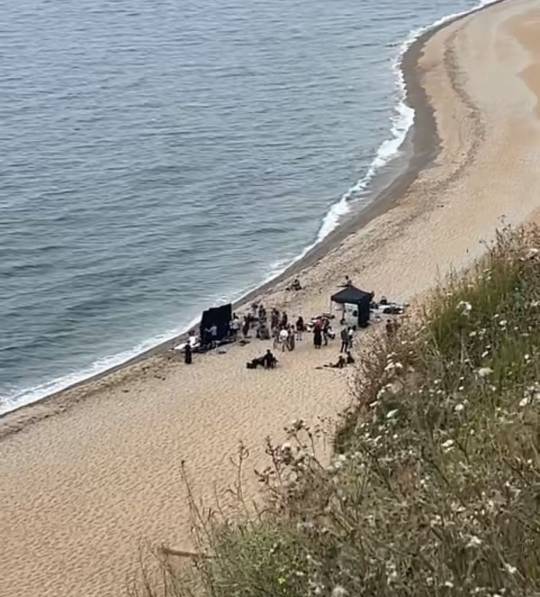

Let's start off with the relevant images!
We've got Dream and Orpheus on a beach. We've got one scene where Dream is hidden behind a whole big stage piece too. What could it all mean??
In no particular order, my thoughts:
This is probably the scene in the comics where Orpheus disowns his father. In the comic, they do it at Dream's palace, but that's probably expensive AND they could poetically be going for that farewell also taking place in the same location that Dream finds Orpheus's severed head later. I wouldn't blame them if they went that route.

Which would make it this scene. One of the shots if of Orpheus walking away from Dream, so that would make sense.
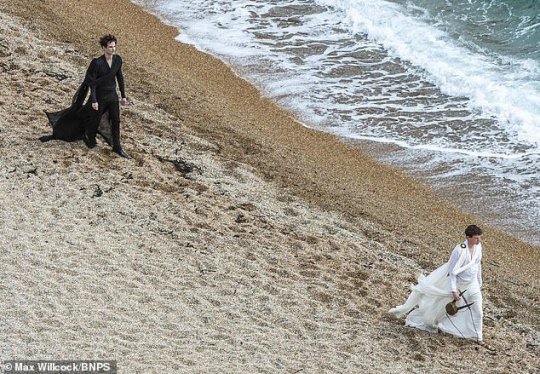
Lines up pretty nicely.
However, it does reverse things a bit. Instead of Orpheus coming to Dream for help, it implies that Dream goes looking for Orpheus while he's mourning on the beach.
The other alternative is that this is after Orpheus tried and failed to save Eurydice. And in the narrow possibility that that's the case, this could be a replacement for the scene where Calliope urges Orpheus to run because the Maenads are bearing down on him.
I kind of hope not. If they replace the scene of Orpheus mourning his failure and his mother coming to warn him about the Maenads and Orpheus ignoring that advice, in favor of having Dream have that scene with Orpheus, it in my mind lends to the possibility that Calliope thinks Orpheus died in the Underworld or some other sequence of it events that culminates in her not knowing her son is a living severed head.
I really, really hope we're not heading to a TV show AU where Orpheus is the living severed head like in the comics, but Calliope doesn't know about it. Because while Calliope in the comics also, like in the show, says that their son is dead the comic also has her visiting Orpheus's severed head throughout his thousands of years of hellish living-death.
Personally, just speaking for myself, I find the entire living-severed-head plotline deeply uncomfortable. I've said before I think it accidentally smacks of ableism to hear over and over again Dream's insistence that Orpheus is "dead" even though he's clearly conscious and able to sleep and dream and talk and have desires about the world, but just isn't able to move on his own anymore. That's not death, that's being a paraplegic. The comic makes it further ambiguous because it seems like Dream is lying to himself when he says his son died long ago. It's also confusing because Calliope, on the whole, seems kinda chill about her son being dead all the times we see her. She and Dream seem like very distant parents if they can bear the pain of their sons literal active torment for thousands of years.
The thought of Dream in the show denying Orpheus even the comfort of his mother is actually completely irredeemably worse in my mind. And the way Calliope discusses mourning their son and Dream's silence in the face of that makes me deeply fear that possibility.
Which is one reason I hope there's no severed head plotline at all. However,
The fact that we've already had Dream reference, in 1.06, that Lady Johanna completed a task for him which, in the comics, was rescuing Orpheus's living severed head, makes me very worried we're sticking to comic canon.
2. The fact that in these set leaks, we see a sort of mini-sound stage where conceivably, Dream could be finding Orpheus's severed head, thus making the disownment scene and the discovery of his head scene take place on the same beach (which would make a ton of sense from a poetic and from a production economy standpoint) make a lot of sense.
Maybe we'll get a variation where Dream finds Orpheus's totally dead severed head on that beach. Maybe Lady Johanna will only be rescuing the skull or the body of Orpheus and they'll make it much, much clearer that Orpheus is just sort of haunting the head, like he can be summoned to it but he's not living in a hellish state of undeath the whole time...?
I could see Dream, by the way, giving that little smirk he does in 1889 about having Lady Johanna do a task for him and succeeding admirably if she was sent to rescue his son's very dead remains and not his actual living severed head. Dream's impishness does not jive at all for me in that scene with the seriousness of the task Johanna does for him in the comic of rescuing Orpheus's helpless severed head. It's very jarring if that's what they go with. It makes me think this plotline is going to be altered somehow. Like having the severed head be dead but just being like a summoning point for Orpheus's oracular powers, perhaps?
In any case, lots of questions raised and answered by these set photos. After all, we still don't have confirmed:
That the severed head plot will be there at all
That we're not just getting a flashback to Orpheus's total perma-death, not the beginning of his severed-head living death
That this is more than just a brief flashback or the introduction of who Orpheus is and we're getting a totally different storyline, like for example that Orpheus is dead on this day, but the severed head can be used to speak to his ghost (infinitely preferable, in my mind, but there's no evidence in any which way for this except Vibes)
We really just don't know yet.
Though, I will say, I hope they get Orpheus some robes where the top and the bottom match, and Dream some shoes that aren't modern dress shoes (oh, and find his ruby??) before any of that happens ;P
81 notes
·
View notes
Text
[go go loser ranger manga spoilers - vol. 6 | ch. 43-42]
SSHSNDJDJDUKSJDHS
i don't even know if i can be coherent here odjdjfjf
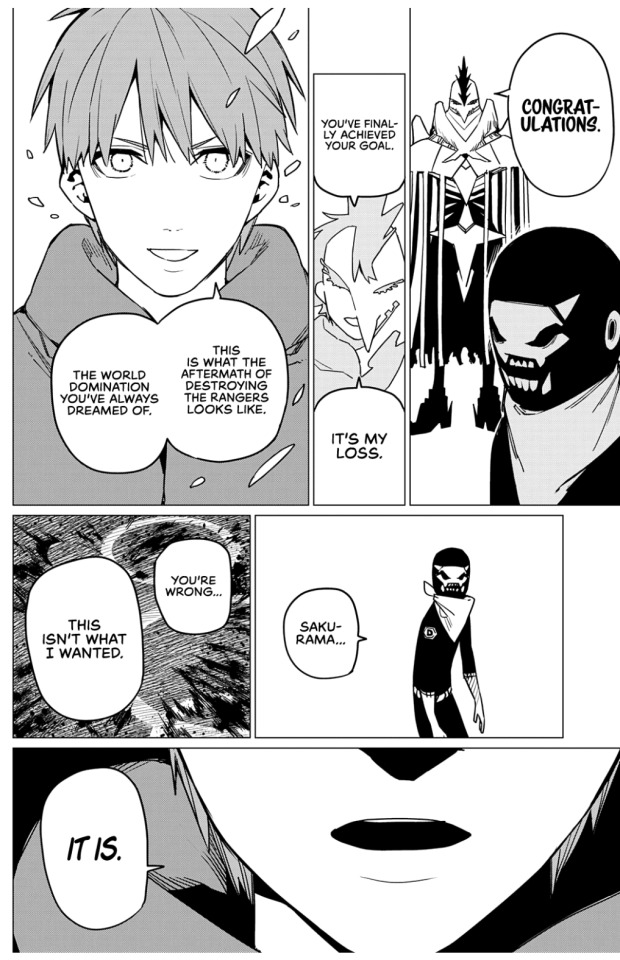
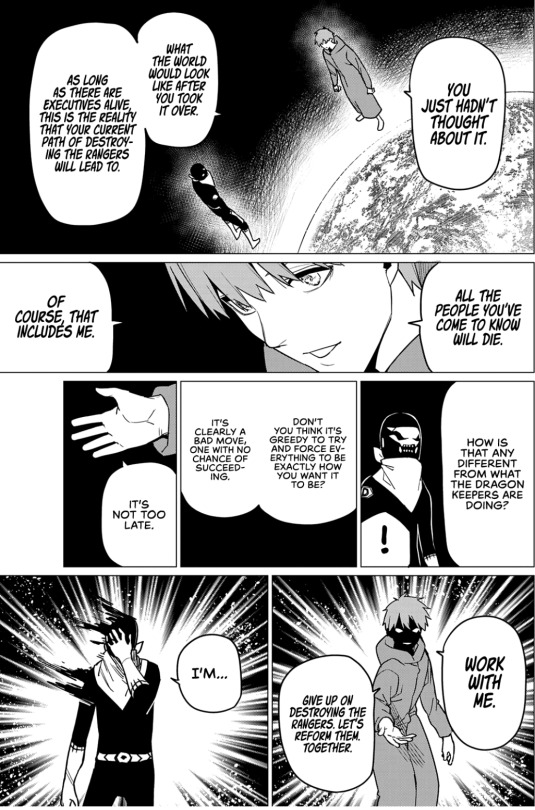
what a way to start the volume. GOD i love the internal struggle. the imaginary dream sequence. the way it almost mirrors the meal scene with the dragon keepers, with peltrola coming in and killing that chef the way akabane killed his jfc. it's nit a 1-to-1 comparison but it just reminded me of that same old rottenness. and the fact that sakurama is d's conscience so to speak... oufjfjfjfj
it makes sense that d would resolve to get rid of both the dragons keepers AND the executives. to him, they're the same. it is heartwarming to see him regard his cadet buddies as special, so much so that d is unsettled by the idea that HE would hold such power over them. the same power and authority that he despises from the dragon keepers and executives.
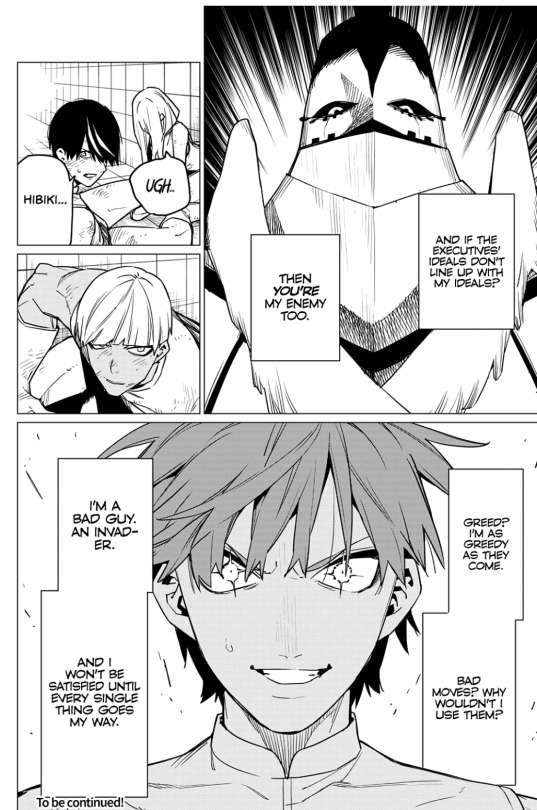
HIS EYES. HE HAS THE UNSETTLING SPARKLES! NO D YOU'RE FALLING INTO THE TRAP!!
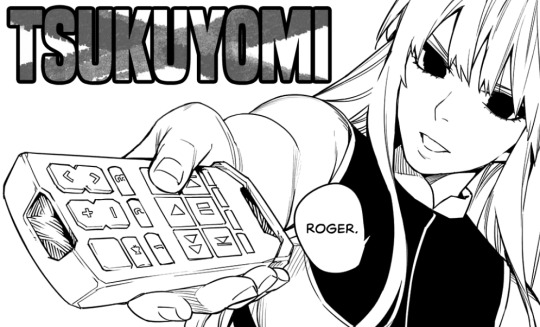
ok i just wanted to say that this made me laugh. like first nadeshiko's panacea thing was funny and then suzukiri pulls out a tv remote like HELLO????
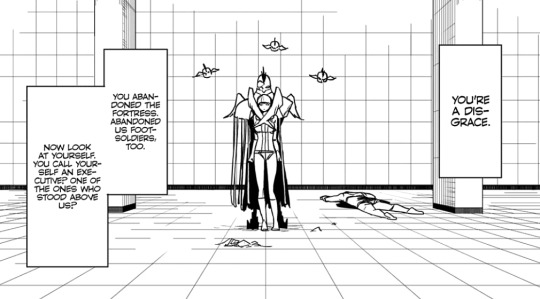
i love d standing up for himself like this but i can also see the slippery slope of becoming like the executives... getting what you want and forcing that onto others... i wouldn't be surprised if d one day becomes an executive and has to grapple with that. hell, maybe in the later chapters he becomes a dragon keeper AND executive... damn.
i will say, peltrola is an interesting antagonist. someone so holier-than-thou who sees themselves as a god,,, an interesting match-up to the dragon keepers' divine sense of authority, what with their divine dragon tools.
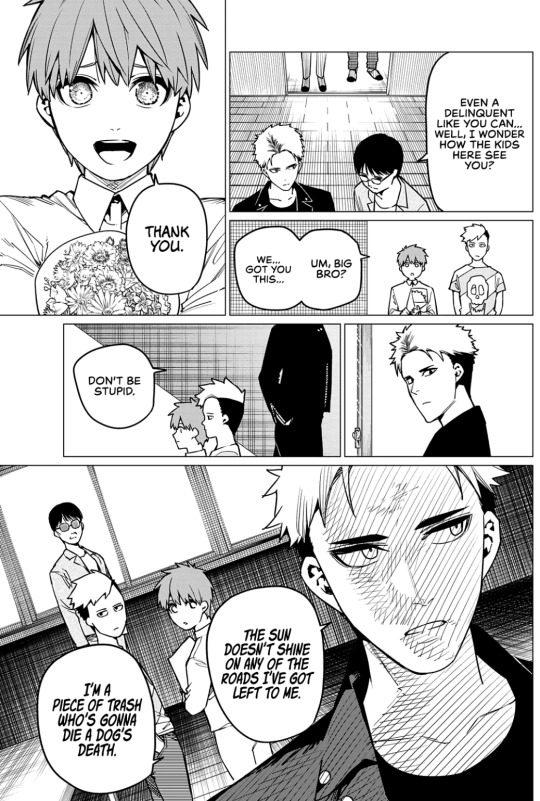
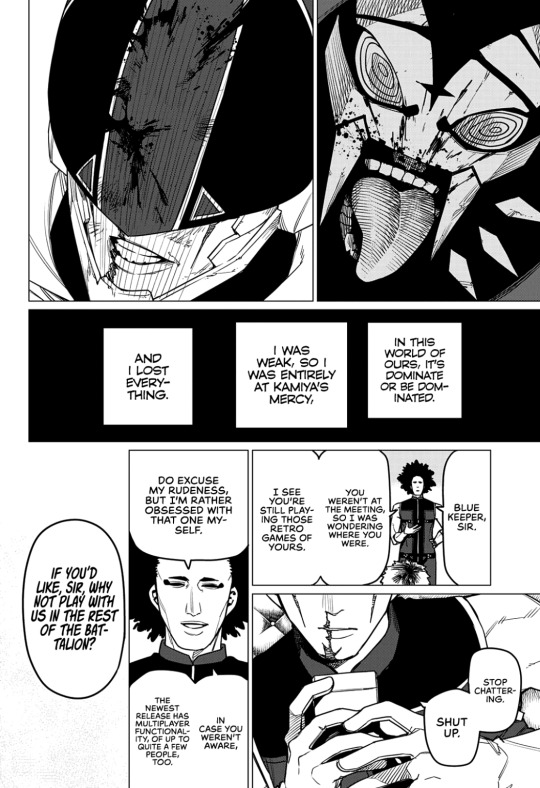
okay i did not like blue keeper when he was introduced, but i think that's normal. i still don't like him but i do find him a lot more interesting and i appreciate his sense of self-awareness. living your life knowing you toe the line between good and evil, never committing fully to one, and feeling that your resolve wavers because of it... like damn. you did not deserve to die. you deserved to live and commit to doing better. death isn't redemption, it's just a tragedy. speaking of..
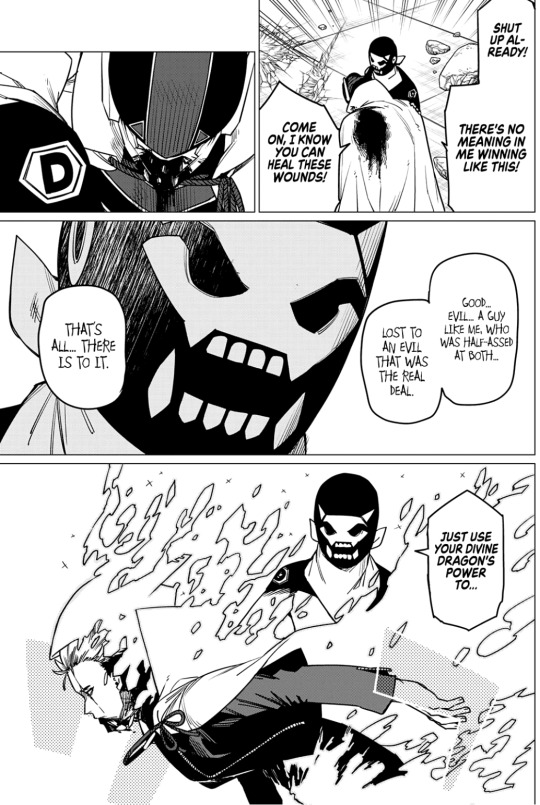
holy hell. the way d's murder of blue keeper was actually horrifying. just... the juxtaposition between d achieving his goal but feeling empty with loss anyway just hit so hard.
also (backtracking a bit) lil hibiki and tokita!!!!!! would not be surprised if tokita modeled his look after aogama. also aoyome and aogama's relationship is sweet. i like how she sees the best in him even if the worst of him shouldn't be ignored or excused.
OKAY i didn't realize there's an image limit so here's my other fav panels:
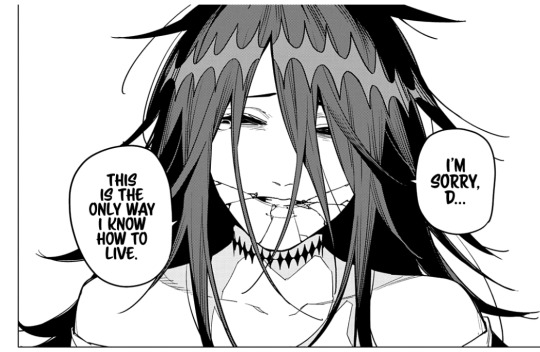
;u; xx,,,, they're both just trying to carve meaning out of their existence (that backstory into d was also just... ough. there's,,, probably parallels there with blue keeper. raised to be a shield, a scapegoat, a loser... god...
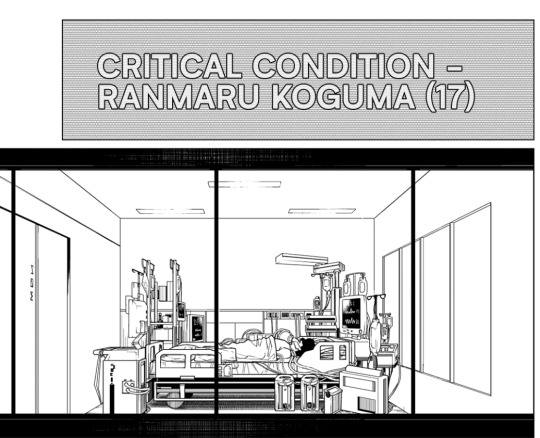
THE WAY I INTERNALLY SCREAMED. I'M SO HAPPY WAAAAAAAA
the fav is alive i am JUMPING FOR JOY
NO IDEA if koguma will be like,,, a friend or ally. or used as bait or get hurt again,,, leave him alone pls. also rip sojiro, you were a real one. really symbolic that the oldest veteran cadet of them there died, kinda symbolizes the passing of a baton... damn. rest in peace.
also - suzukiri! achieved her goal once more. she's so so interesting. i wonder what sakurama is up to...
okay look. i like sesera a lot but her thing with sakurama is NOT IT DNDMFNND. i know it's a trope but the fcking body pillow was so weird, like cmon. i still like her though, she's my fav of the dragon keepers. that,, might change going forward im not sure. i do like,,, sharks,, green keeper arc is next? shark teeth a+ design heeeee.
ONTO VOLUME 7 WAHOOOO
#go go loser ranger#go go loser ranger manga spoilers#go go loser ranger spoilers#sentai daishikkaku#review
12 notes
·
View notes
Note
i feel like it's worth noting that even though combustion man had every intention of killing the gaang, and therefore, sokka's actions are like, justifiable—there's no way he could've known a boomerang to the head would cause an internal explosion and kill the assassin. or that it would do anything besides knock the guy out so they can escape. like??? people do be wilding out here
also, i'm rewatching the show rn and i was wondering if you had any thoughts on the significance (if any) of zuko not having his scar in his dream after he frees appa?
I mean he didn’t know it would kill him, but I’m sure it’s the most desirable outcome for him, seeing as killing him means ending his pursuit (to quote katara) permanently. sokka has no problem with killing people if they’ve tried to kill him first. he wanted to let zuko die in the north pole. he sliced open melonlord’s head all “there. that’s how it’s done.” granted, he did spare azula on the gondola, but there were a lot of factors at play there. for the most part sokka has no qualms with killing enemy combatants, although he also does seem to want to minimize casualties as much as possible. he can be cold, calculating, and even ruthless, but he is not aggressive or bloodthirsty in the slightest. in that sense I think he and azula are similar, whereas zuko and katara are far more aggressive and out for blood due to their inner rage rather than any innate understanding of the necessary cost of war. they can talk a big game, but ultimately, sokka and azula will do what needs to be done, while katara and zuko talk about getting revenge but are too sensitive to actually take a life when faced with the prospect (and to be clear, I don’t think either approach is wrong or right, it’s simply how they are as people). acknowledging that sokka has a kill count isn’t a bad thing, but treating that fact as if it makes him immoral is also incorrect. he does not kill for the sake of killing. he knows he is in a war, and he kills out of necessity.
and yeah! there’s been a lot of great analysis of that dream sequence, as it’s obviously very symbolic and however you read it, it provides a lot of insight into his character arc. one thing to note is that besides this dream sequence, I don’t think zuko ever looks into a mirror. (and note that when azula does look into a mirror, she breaks it.) I don’t think zuko can stand to look at his own reflection. keep in mind that zuko’s entire dream sequence is a product of his body being unable to process the trauma of performing an act in which he disobeys ozai’s conditioning. iroh forces him to challenge what he thinks he should do versus his deeper instincts, and since he’s spent the past three years ignoring those instincts, burning them away and then snuffing them out with ozai’s lessons taking their place, his body doesn’t know how to process the action of him going against the dogma that has fueled him for years. his body is punishing itself in place of the punishment he feels he must receive after disobeying ozai’s orders. he’s recovering from a wound, only this time, it’s psychological (internal) rather than physical (external). (sidenote: this is why I hate seeing people joke that “zuko did one good thing and then promptly fell ill” like yeah it’s his body’s response to the severe trauma of his abuse haha hilarious!) so this is the context for zuko’s feverish reevalation. he’s undergoing the realization that in ba sing se, ozai cannot actually reach him, and therefore he is safe to be who he wants to be. of course, this isn’t entirely true either. he’s not actually being who he wants to be once he recovers from his fever, he’s being who iroh wants him to be. he’s replacing one father with another. he’s still scared of the consequences of disappointing his patriarch, so he plays the perfect son and pretends to be happy. of course this facade cannot last either, which is foreshadowed by the two dragons in zuko’s dream, iroh and azula. both of them have an agenda for zuko, and here he sits, scarless, at a crossroads.
#sincerelyjordan#asks#analysis#I’ve seen good analysis of this dream sequence recently maybe I’ll link it if I can find it#since this is obv barely scratching the surface#edit: added it! please read it it’s very good#but I think the point about zuko trading ozai for iroh is really important#maybe I’ll expand on this at some point#sokka#zuko#iroh&zuko#ozai&zuko
128 notes
·
View notes
Note
I was thinking about how Kendra really should've been mentioned in Fool For Love given its an episode where Buffy wants to learn about previous Slayers' final battles so Top 5 episodes in which Kendra should've been mentioned in?
Ignoring the episodes I'd have liked to actually see Bianca Lawson return in (either in flashback or some alternate dimension or in a dream sequence or as the First) and ignoring Fool For Love as well since you mentioned it already (but I agree that's a good call otherwise).
S3E07 Revelations -- obviously Angel didn't personally kill Kendra, but he played a very major role in her death (she came back to Sunnydale to stop his plan to wake Acathla, he lured Buffy away from the library so she wasn't there to protect her, he sent Drusilla to kidnap Giles and Kendra tried to stop her). So it would have been nice, in a way, if anybody had thought to bring Kendra up during that scene in the library where they're arguing about Buffy keeping Angel's return a secret and how he killed Jenny Calendar and tortured Giles. Especially when they're doing so mere feet away from the spot where Kendra was murdered. It would have nice to suggest that Buffy wanted to talk to Faith about Kendra at the end, too (even though I think Faith still brushes her off the way she does in canon).
S3E08 Lovers Walk Relatedly, it would have been nice if -- while Spike was busy feeling sorry for himself and remembering all the nice spots in Sunnydale where he and Dru had murdered people in better times -- the writers had remembered Buffy had reminded him that one of the people his ex had fun murdering was Kendra. Or that, way back in Becoming Part 2, the very last time Buffy said Kendra's name out loud in the show came with a threat to kill Drusilla ("Forget about Drusilla. She doesn't walk. She killed Kendra.")
S3E15 Consequences. Don't think this even needed Kendra to be mentioned by name, but it would have been nice if the show had acknowleged that this is in the third time in barely a year than Buffy has been questioned by the police in a murder investigation. And by the same guy all three times! Detective Stein doesn't seem to be part of the town-wide conspiracy to cover up the supernatural, so what does he think really happened to Ted and to Kendra? I get that the show at this point wasn't trying to be too serialized (but Ted, at least, will get brought up at least one more time in Season 4's Fear Itself), but ... I dunno, I just think it would have been a nice bit of continuity to have Stein tell somebody (Buffy? the Mayor?) that not only does he think Buffy was involved in Finch's death but that he still hasn't ruled out her being involved in Kendra's death too (whatever his bosses told him to make him drop it).
S5E14 Crush. This isn't actually a very good episode (as indicated by the words 'written by David Fury' that appear on the screen at the beginning) so we can't expect too much from it, but ... look! It's Drusilla! Back in town for the first time since Becoming! And Spike's talking about killing her, even. "Why do I care?" Buffy asks him, which would be a perfectly fine way for Buffy to express her disinterest in Spike and demonstrate her refusual to be swayed by his attempts at coercing her to 'admit' her romantic feelings for him if this were any other random vampire, but this is meant to be a vampire Buffy has a strong preexisting personal grudge against. She killed Kendra, David. That's why Buffy should care. You could, I dunno, at least have Spike bring that up again? ("If you don't admit there's something there ... I'll untie Dru, let her kill you instead. Just like she killed that other Slayer.")
S7E17 Lies My Parents Told Me. I mean, not the canon version of the episode, which is basically unsalvagable, but in some other better version of this episode where Buffy finds out that Robin was Nikki's son it might have been nice to contrast Robin's years long quest for revenge with the fact that Buffy didn't allow herself to leave town and hunt Drusilla down for revenge. Not because she didn't care about Kendra (at least, she cares about Kendra in my version of the show...), but because she had a responsibility to everyone alive in Sunnydale. That would, at least, be a better way to echo Nikki's "the mission is what matters" line than the gross way the episode settles on ("You're trying to get revenge on a man who doesn't exist anymore! Also, isn't it cool and fitting he got 'his' coat back?")
16 notes
·
View notes
Text
Okay I’ve had a good day to contemplate this shit- let’s do this. I’m going to start with the fact that I found tsats aggressively disappointing- if you have an issue with that, leave now.
Addressing the highly debated concept of Will and Nico being incredibly OOC- I 100% agree. That doesn’t mean that teenagers don’t change, but they took away so much of both Will and Nicos personalities. Will genuinely lost so much- he used to be a very fun and honest enjoyable character even under stress, but we didn’t get any of that. While I like the concept of Will being rather uninformed and having a really hard time in the underworld, it was overdone and Shoved Down Our Throats from the beginning. That whole scene when Will was talking to Persephone??? (That’s an ENTIRE other post lmk if you want that) He just kept being like ‘ew this place that’s clearly special to you? Yucky.’ He insisted on going on a quest with Nico (which other people were clearly more well suited for,) then proceeded to insult Nico’s second home quite often. It’s like Riordan and Oshiro squished his character and made him two dimensional.
As for Nico, he’s missing a lot. I understand coming to terms with some trauma and your personality changing, (which is literally what the entire book is about) but it’s so extreme. They took the Nico out of Nico. This boy would never come out to an entire camp in some huge display to ask a boy out. Come on.
Uhm PERCY AND ANNABETH??? Bruh what was that scene??? Though the whole page 69 thing was amusing- they were just like Oopsie Poopsie We Fucked Up but you get to deal with it have fun 🤩. (Again, that whole scene was really OOC and an entire other post)
Uh oh the big one- the really weird queer rep. Before y’all come at me, I’m gay as hell, this shit isn’t new. Anyway, it felt really forced. The queer rep in ToA was amazing because it was casual and normal- this was not that. Why were demons coming out to them. Tf. The acceptance subplot is amazing in theory, but again, it was Shoved Down Our Throats. It’s like they slapped a rainbow sticker on the book and suddenly it’s supposed to be amazing. It felt shallow and artificial.
What on earth was Will doing down there??? Think about it- we have Hazel, Reyna, and a few other characters who were either not mentioned or barely mentioned who would have been better suited to the underworld.
Will and Nicos relationship felt really toxic and superficial- I get that it’s their first relationship and it’s not going to be perfect, but they were arguing the whole time, they had no chemistry, and they seemed like they hated each other.
On a similar note, this book lost the whole Acceptance thing from the other people Nico loves. HAZEL??? REYNA??? APOLLO??? They were all left out, and any mention of them felt like a rushed afterthought.
Another big one- the trauma motif. (Again speaking as a biatch with ptsd) Nico was scarily self aware- this whole book is supposed to be about Nico growing and being a kid, yet it was always Trauma Trauma Trauma Childhood Trauma, and he was aggressively self aware- there was no growth there. Things like that take time- and that wasn’t represented. It was like somebody snapped their fingers and Nico became a really angsty self aware therapist.
The conflict of the book felt half baked. Literally why did Nyx care. I don’t know. Does she? There wasn’t much action. (except for the dream sequences, those were good.) Tartarus didn’t feel dangerous or scary. I liked the idea of the Cocoa Puffs, but that also felt half baked. Instead of being like ‘these are literally you’ Nyx was like ‘these are your children lmao 🫃👶👶👶’ that storyline had so much potential but it didn’t really work out.
The whole damn thing read like fanfiction. It felt like Twitter fan service
Also Will was ignored??? This book was supposed to be about Nico and Will, but it ended up being just Nico. I wanted to see anxiety Will :(
Rick Riordan has done really well creating engaging middle reader books in the past, but this felt very Fourth Grade Learn About Gay People And Trauma.
Overall, there were good parts to the book, but I didn’t like it. The entire thing felt half baked and two dimensional. I’m going to reread some of Riordans work, and read some of Oshiros books to try to find the disconnect.
#tsats spoilers#yes I’m updating this as I think of more#the sun and the star#nico di angelo#will solace#solangelo#book review#i guess#hello my favorite person
58 notes
·
View notes
Text
GUESS WHO SAW THE FNAF MOVIE
It’s theory time baby 😎 because I am incapable of being normal about things I like!
SPOILERS UNDER THE CUT, YOU HAVE BEENW WARNED
First things first, I’ve gotta say, I kinda love the bait and switch they did with the Freddy and Golden Freddy spirits, as much as it was also a little confusing.

Looking at this photo right, you’d assume that the kid in the brown shirt is freddy and the kid in the yellow shirt with the tophat is golden freddy, right? And yet, when Max is being lured towards Freddy, it’s the kid in the yellow shirt luring her closer, and it’s his voice that comes from inside.
And in the only scene where Golden Freddy appears, so does the kid in the brown shirt. He even says “Not Freddy” when Abby calls him Freddy. He’s the leader of the group the whole time, and seemingly the most intelligent, always portrayed standing out from the rest. Not to mention, something very important- Golden Freddy never actually enters the building. He stops outside when Abby goes in. And in the dream sequence where the kids attack Mike- it’s the kid with the bunny ears, the kid with the hook, the girl with pigtails, and the kid in the yellow shirt with a tophat. Bonnie, Foxy, Chica, Freddy. Not Golden Freddy, because he isn’t in the building. Why he isn’t? I don’t know. But another thing: we’ve seen a blonde kid with straight cut bangs before
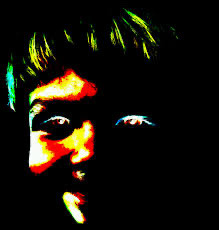
The Vengeful Spirit from UCN. And the way the kid in the brown shirt watches William at the end of the movie? You can’t tell me that’s not a vengeful spirit thing to do.
Anyways. Finally getting to my actual point with this. The theory!
So, the cupcake. Pretty much the most feral animatronic in the whole movie. Overall much more aggressive then the other four, to the point that prior to the start of the movie it was locked away in a cabinet. It behaves pretty much as Chica’s attack dog.
And where have we seen Chica (or the little girl inside of her) with a dog before? 🤔

….yeah you probably could’ve guessed where i was going with this. This theory is pretty much just speculation, that I only really have two main pieces of evidence for: number one being what I already mentioned, that the cupcake is overall much more aggressive and less intelligent then the other animatronics; number 2 being that there is absolutely no way a human child could’ve been fit into that cupcake (ignoring the fact that all five of the missing children are already accounted for). But a dog, especially a little one? One of the breeds we associate with being “ankle biters”? Absolutely
Anyways yeah I genuinely could not tell you whether this is the case or not but I thought it was a cool possibility and it’s the interpretation I’m sticking with 🫡
(Also it was a nice touch that the guy the cupcake mauled was named Carl. I appreciated that nod to the fanbase, as well as his midnight motorist t shirt. Honestly all of the easter eggs and references in this movie were top tier)
Overall, i loved the movie and it will be plaguing my thoughts for the next couple of weeks. If you read all of this, thanks! I appreciate it
#fnaf movie#fnaf movie spoilers#fnaf movie theory#fnaf#five nights at freddy's#the vengeful spirit#golden freddy#freddy fazbear#the cupcake#i genuinely dont know what to tag this#hopefully this shall suffice
23 notes
·
View notes
Text
here's my 2.2 & 2.1 thoughts in the most resumed way i can master at the moment (and yes it's related entirely to aventurine sorry but this patch gave even more context to the sentencing and confirmed my suspicions all along)
first of all I wanna mention real quick that this is all my personal interpretation and analysis, you're more than welcome to ignore it if you don't find it agrees with you. with that out of the way let me deconstruct some stuff that was foreshadowed in the 2.1. and that was later reflected in 2.2.
the whole dead man walking Aventurine went through always left me a feeling that something wasn't quite right with it. It wasn't so much that his "future" self seemed to be all knowing or that the "young child" was too innocent to be considered him. this can be somewhat explained by the "crows" eyeing Aventurine continuously during his stay in Penacony as well as some investigation done into his file (criminal or employee or even with memokeepers).
during the trial with Sunday, Sunday himself asks very particular questions to Aventurine that not only cement the belief that he is to be executed, but also that they have insider information on him that'll further aid the sentencing take place.
here's the thing though, this was Aventurine's plan all along. He was indeed meant to "die" in the dream world, using his own cornerstone to create a reason for the Family to intervene on him and "kill" him. what he did not anticipate, was the trial Sunday put him through, nor the "execution" method employed.
and this is where it started to be odd to me.
the dialogue used by the dream fabrications were all inciting to "stay" to "join" but they also offered "death". why would you offer a painless past and a "future" when the person is meant to "die"? at first, i thought it was because of the "no death in the dreamscape" situation however, after 2.2, and revisiting the dream hallucination sequence i realized this is because he was given a choice. and this is what was feeling off.
i want to emphasize something before proceeding further, the "past self" and the "future self" are both fabrications of the harmony/order based on their assumption of Aventurine. i say this because his past self is painted in the presumption of innocence given to all children (since it ignores his self doubt in the goddess and him throwing his life away since he was a kid), his "future self" is the presumption of his current character assuming he is arrogant, brash, self centered, cunning and ultimately, suicidal. none of these visions are his true self! and let me prove you why i assumed this since the start and why i was so annoyed when people were taking the trial at face value.


first of all for the order/harmony he's not meant to die but he was not meant to stay either. what i mean by this is that he was to be rid off one way or the other, if they succeeded in making him chose the dream he would have been the first one to the "righteous dream" and Penacony would be saved, if he chose to proceed with his death in the dream world, they just had to let him do it without harming the guests because then he would just be trapped in the real world without being able to take action.
and aventurine took notice of this. in fact, he realized his bluff failed and that they knew he had the aventurine cornerstone (they just didn't know how he got it).

from here on out he is playing a role. everything that the past and future throw at him he gives decisive reactions that'll satisfy both. The past he treats tenderly, the future he reacts as a prideful wounded dog exposed for his misbehavior. and he even says this to the delusions giving them a warning of just who they're dealing with

although he spends a lot of time playing the fool he also throws jabs at their deceit attempts since they are very poorly masked. they are trying hard to break his mind by making him feel that they know all there is about him but he is not backing down. he reveals the plan to the delusion openly without fear



i'm secure in saying this because even though the delusion speaks of an Emanator, they do not specify which one (i'm assuming they thought he was working with Black Swan as she's the only Emanator they would know for sure is in the dreamscape, Acheron was only confronted past her slashing the dream). And Aventurine does not react beyond silence, keeping it from getting more information than necessary. again, they are aware of the general, not of the specifics and they are trying to lure it out of him.
I also want to mention that the Family was expecting Opal to be the one who took the job, which is showing why even though they did some research on Aventurine, it wasn't deep enough to fully get him to surrender.

a lot of their jabs at him are through self inference and this is shown through the following question

this is where i went "ah they are truly just assuming" because Diamond did not chose him, it was Opal himself. Diamond is aware of Aventurine is responsible for the mission, however it was not him who personally chose him

through all of this, Aventurine's answers are all just confirming the delusions assumptions of his character and his plan, giving them room to think that they are winning/correct (much like he did with Sunday)
they only start to change their approach once they realize that pushing the unjust destiny onto Aventurine isn't working. the following dialogue shows them questioning him why won't he surrender to the dream? after all, he is meant to die. he has to.but he can escape it if he stays, giving him the choice to "repent".
the first instance we catch this direct questioning is with his "young self" asking him why he hates what he's seeing. by all means, a past where all his family is alive and he got to experience life as an actual kid and not as a refugee should be enough to make him want to stay

to this he answers that it's because his real family is not there. showcasing that even despite the wishful thinking he chooses the painful truth. this only pushes the delusions to further provoke him by unveiling his plan to himself and make it seem pointless. saying that their offer to enter this "dream" is the greatest honor they can grant to those who hurdle towards death (later on we see this applied to the old man dying and using Penacony to have his last moments in peace)
Aventurine does not like this and he openly challenges the change of tune. to him, the offer of a life outside of death is insulting specially given that they know of his "destiny".

throughout the sequence the "future" has asked if he did not wish once that he wasn't blessed or predestined. Aventurine only offers silence. it's only when the delusions give up on changing his mind and accept his death that he finally speaks the truth about what he feels about the dream and about his life/destiny

and now you're like, ok Z so you're saying that the Harmony/Order just let him go to his "death" without interfering? yes and no.
yes, because it had been decided since the beginning of the trial that Aventurine was going to die. He himself called his trial an execution and rightfully so.
however, they did extend their invite to him. whether this was Sunday's doing or the Dreammaster, the intention was expressed for him to stay behind and give up on his plan. there was a show of benevolence that is reaffirmed loudly in 2.2. to the MC
the last line we see of the dream hallucination sequence is Sunday asking him the final question of his trial. One he actually answered truthfully.

i believe this is what earned him the hallucination sequence and the choice since it wouldn't make sense to try to repent a truly evil man. however to discard someone who "can be saved" isn't something the harmony/order preaches, the choice was given to him as a chance for him to escape his destiny and to forget his past.
as we know, Aventurine still went through with his "death" and officially put himself out of reach of the dream. this is because his death wasn't truly the thing that would get the IPC to sit at the table with the Harmony, but that it would be a trigger to expose the real reason why the negotiations would take place in the end. to allow him to "die" the Family unknowingly sealed their fate and he's to blame for making them believe the contrary.
#ooc;#again this man is fucking intelligent#i know it feels like a reach but reach is all i do man i don't care#i'm writing a meta that needed me to go through the 2.1 dream sequence again and i was like HOLD UP...#tesserae;
7 notes
·
View notes
Text
liner notes/unused joke summaries for kiss fics (part vii)
Despite what my general dislike of the shift key and my tendency to mock all that I love might imply, I actually overthink everything I write to a great extent. I make no claims to these explanations being in any way enjoyable, but if you wanted to know what I was thinking while writing KISS fic… now you do. Part one can be found here. Part two is here. Part three is here. Part four is here. Part five is here.
shock them, show them --Ace and Paul have smoking hot lesbian sex just like in a drive-in movie theater porno. Well. Except for the part where Ace makes Paul sing "Shock Me" acapella, post-coital.
>>Ace/Paul is one of my not-so-guilty pleasures and they just have a fun dynamic. It had been a long time since I'd written the pairing, and I really enjoyed Ace's lack of pretense and impatience with Paul's stress and tendency to overanalyze. I also enjoyed small bits, like the fact that even though Paul tells him they'll go again if he (Paul) gets eaten out first, Ace doesn't ever eat him out, and that Paul initially refuses the thought of scissoring only to get really into it not too long after.
Other things I liked: Paul feeling more masculine/more himself around Ace (after all that time with Gene), and managing to seduce him a bit. Title is, of course, another lyric from the Stones' "Little T&A."
little rock 'n' roll --Paul spends five days doing almost nothing in the wake of getting turned into a girl by a vengeful groupie by way of a demon. Besides try to masturbate.
>>I had written this out in part a long, long time ago mostly as a writing exercise for myself while writing "little t&a," but as it kept expanding, I decided someone might find it interesting enough to actually post. I wanted the freedom to explore some really weird things-- I don't think Marbas had anything to do with the dreams Paul was having, but that's up to interpretation. I wanted to work with Paul's poorly-established sense of self and his own issues with sexuality/gender, which was mostly accomplished through the dream sequences where he was, in effect, reinterpreting parts of his life with a female lens, and (poorly) addressing things he had latent issues with (his own bisexuality and femininity). Also, I just found the body horror aspect interesting to explore and the difference Paul experienced in how other people were treating him, especially when he was alone.
catch my drift --Gene manages to bed one of the hottest women of the eighties after nerding out about Lon Chaney movies.
>>I really wrote this in an attempt to fully get at what it's like to be around Gene Simmons as a woman and get a sense of his presence/confidence as he's really... the guy is something else, all the rumors are true, etc. etc. etc. He has ridiculous eye contact, he pays ridiculous amounts of attention to everything you say, and he acts extremely invested in what you have to say. Yes, it's because he wants money/sex/etc. out of you, but boy, the times I have seen and the time I have met him, I have fully understood exactly how he got so many women. I don't think I fully encapsulated it in the story, but I tried!
I hesitated to finish and post it, too, because Vanity in real life was extremely troubled and, in the early nineties, changed her life very dramatically and became a preacher, so I worried that writing about her during this point in her life would come off as if I was disrespecting her and ignoring her later choices to focus on a period she wasn't proud of. I thought about it and then decided that if her story was one she was willing to share in her autobiography and in public (in some amount of detail), then, well, I was probably okay to go ahead with it. Vanity's eighties lifestyle was not sustainable on any front and she battled addiction, eventually getting clean in the nineties after some serious health consequences. I'm proud of her for that.
c'mon, get your feet wet --Ace lets Peter hit it from the back, until he decides he'd rather him hit it from the front. Then he meets Marbas, who doesn't bother trying to convince him he'd be better off with tiny boobs.
>>I find Ace really funny even in the face of situations that are terrible. You get the impression in interviews and even in behind the scenes stuff that a part of him is always dryly laughing at how everything has turned out and that he's basically along for the ride even in his own life, for better or for worse. Ace's rockstar insulation isn't that thick, really, and he's at least somewhat self-aware.
That being said, his dynamic with Peter meant that he couldn't manage to goof around and act like things weren't bothering him, which meant he kept trying to turn to drugs and alcohol instead. He's only aware he has a problem that can't be laughed off in the context of where he would be without the creature comforts of being a rock star. An alcoholic drug addict twenty-something girl with no money or family will end up in an objectively worse position financially and physically than an alcoholic drug addict twenty-something multimillionaire (or at least millionaire at that point) rockstar guy. Marbas points out he's set to lose everything anyway, but of course once he's gone, Ace can push all that aside again.
Ace isn't focused on trying to be a girl (for whatever that means) or what that means or anything along those lines. He doesn't have Paul's relatively weak sense of self and nothing about staying like he is is enticing for him. Ace doesn't care about that and all he cares about are the limitations of his current position and the ramifications.
I had a hard time with this piece for a very long time because I didn't feel like I was making it hot enough at all, and when I just gave up on that aspect, the fic managed to come together in an evening (after being on the backburner for months and months). The shower scene was hard up until that point-- once I embraced that Ace would never not be falling over in the shower, it was fine. Peter doesn't really have a whole lot to do beyond treat Ace right, but I wanted him to still feel like Peter.
11 notes
·
View notes
Note
I’m not alright Ghost. I’m so not alright, you broke me ghost
DICK JUST WANTED TO KEEP HIS LITTLE OWLETT WARMMMMM
I was not ready, I was not ready I was absolutely not ready but I read it anyways
AAAAAAAAAAAAAAAAAAAAAAAAAA
The way-the way it transformed into Talon instead of Dick…and then and then the dream sequence being both Talon and Dick showing how he’s still trying to grasp on that everything’s fineeeee, he’s with his owlet, but there’s something wrong something peeking behind the curtain, reality and Dick’s declining mental state by calling himself talon. GODDDDDDD
Ok ok ok ok ok, I’m not ok, but ok, listen! There could be more angst for when Jason returns! Like like, Tim taking on the role because it’s neeeded and he already tried everything to get Dick out of his grief and to get Bruce out his grief and nothing worked. Maybe. Maybe this is the on,y way. Jason is the only way, but he’s not Jason so best he can do is become Robin because Robin is magic. And angst like, like Dick mistaking Tim for Jason and stuff! A voice in the back of Dick’s mind saying “that’s not owlet” but Dick ignoring it because *that’s his owlet*! Look at him, black hair, blue eyes, that’s owlet. Just completely in denial, pushing away the fact that Tim does not look like owlet and is not owlet.
Also also also so much misunderstandings Ghost!! So much, you love those No? Misunderstandings and angst and HEALING lots and lots of HEALINGGGGGG AND COMFORT AT THE ENDDD PLEASEEEEE DICK holding his now big, warm, *alive* owlet in his arms againnnnn
Also ‘is this really it’ breaks me the most currently cuz there’s screaming in it (making me feel of Jason dying and if when Dick wailed to the sky when he found Jason dead) and muffled/faded talking in it (making me think of dead Jason still sorta hearing what’s going on all around him, hearing Dick talk/call to/for him, hearing Bruce and Alfred talk to him. But it also makes me think of like Dick while he lies on the grave hearing Jason talk to him (which is just inside his mind)) and the sad song really drives it home.
AAAAAAAAAAAAAAA
It wasn’t a very coherent argument about why owl song needs to continue…and my wails in agony…I swear I’ll come up with a better argument! But I had to get it out right now
You’re definitely onto something with Tim and Dickie there! Yes, Tim is regarded as part of the family. But with Jason’s absence— yeah, I can see Dick gaslighting himself into thinking Tim is really his owlet. Just for a few minutes, here and there. (Of course that illusion is always mercilessly shattered when Tim fails to respond to Dick’s chirps the way Jason would have).
((And Tim trying so hard to keep everyone from falling apart, burning the candle at both ends. No time for him to grieve, because if he turns away for just a moment— he fears either Bruce or Dick will end up dead, too.))
Oooo yes! “Is this really it” is definitely one of my faves from that playlist too! The faint murmurs of “pick up, please pick up” in the background… kind of fitting. In a very tragic sort of way. I’m so happy you took the time to check out the songs 💚💚💚💚
#successfully managed to break hearts#yessssss#can cross that off my bucket list I guess hehehe#💚💚💚#ghost talks
18 notes
·
View notes